
Find Help
More Items From Ergsy search
-

Can I work or continue sports activities if I have Carpal Tunnel Syndrome?
Relevance: 100%
-

Carpal Tunnel Syndrome
Relevance: 92%
-
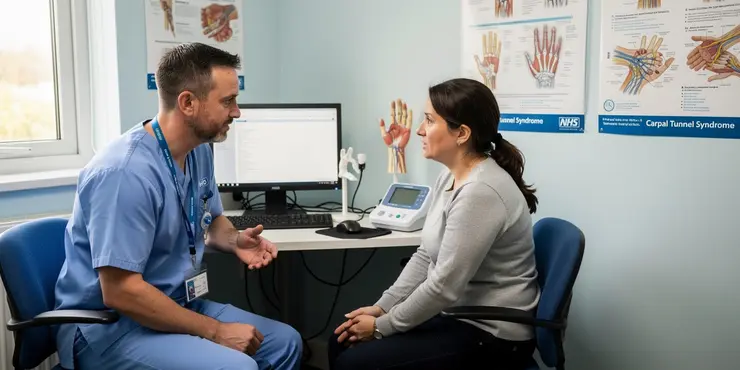
What causes Carpal Tunnel Syndrome?
Relevance: 84%
-

How is Carpal Tunnel Syndrome diagnosed?
Relevance: 82%
-

What is Carpal Tunnel Syndrome (CTS)?
Relevance: 82%
-
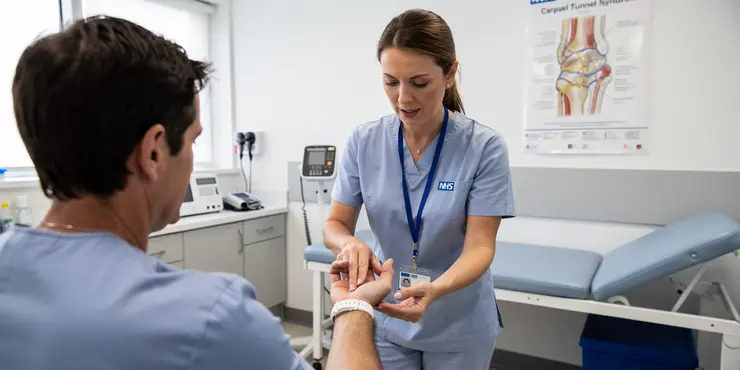
Is Carpal Tunnel Syndrome covered by the NHS?
Relevance: 82%
-
How can I prevent Carpal Tunnel Syndrome?
Relevance: 80%
-

When should I consider surgery for Carpal Tunnel Syndrome?
Relevance: 77%
-

Can Carpal Tunnel Syndrome recur after treatment?
Relevance: 77%
-

What non-surgical treatments are available for Carpal Tunnel Syndrome?
Relevance: 75%
-

Are there any alternative treatments for Carpal Tunnel Syndrome?
Relevance: 75%
-

What does Carpal Tunnel Syndrome surgery involve?
Relevance: 75%
-
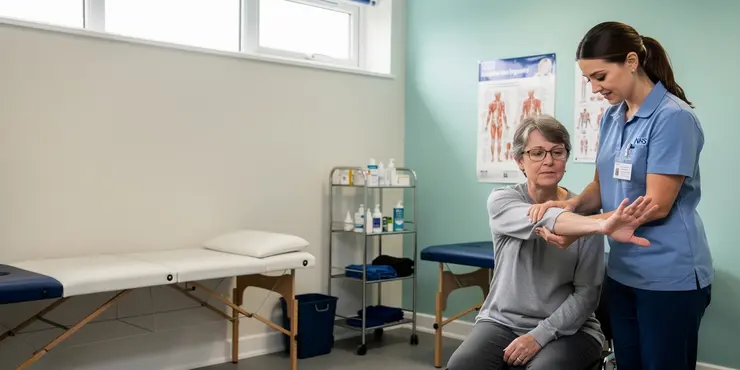
Are there specific exercises that can help with Carpal Tunnel Syndrome?
Relevance: 74%
-

What are the common symptoms of Carpal Tunnel Syndrome?
Relevance: 71%
-

Can lifestyle changes help manage Carpal Tunnel Syndrome?
Relevance: 70%
-

What is the recovery time after Carpal Tunnel Surgery?
Relevance: 57%
-

Do I need additional cover for adventure sports or activities?
Relevance: 40%
-

Is it safe to participate in group sports while pregnant?
Relevance: 29%
-

Can playing sports increase the risk of a concussion?
Relevance: 29%
-

Advice on sports injuries
Relevance: 29%
-

Can you participate in sports or physical activities with a stoma bag?
Relevance: 29%
-

Can chiropractors help with sports injuries?
Relevance: 25%
-

When is it safe to return to normal activities after a concussion?
Relevance: 25%
-
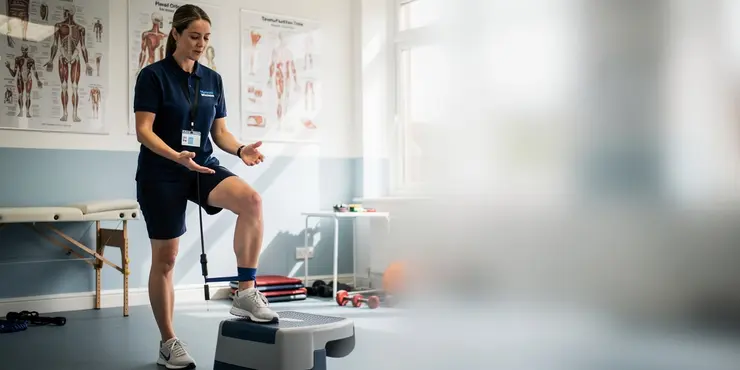
Ask a physio: 3 common sports injuries and what happens next
Relevance: 23%
-

What is Cushing's syndrome?
Relevance: 23%
-

Is chronic fatigue syndrome contagious?
Relevance: 23%
-

Munchausen's syndrome | NHS
Relevance: 23%
-

Down's syndrome: Emily's story | NHS
Relevance: 22%
-

Prader-Willi Syndrome | NHS
Relevance: 22%
-

What causes chronic fatigue syndrome?
Relevance: 22%
-

The Benefits of Family Activities
Relevance: 22%
-
What is chronic fatigue syndrome?
Relevance: 21%
-

Charles Bonnet Syndrome
Relevance: 21%
-
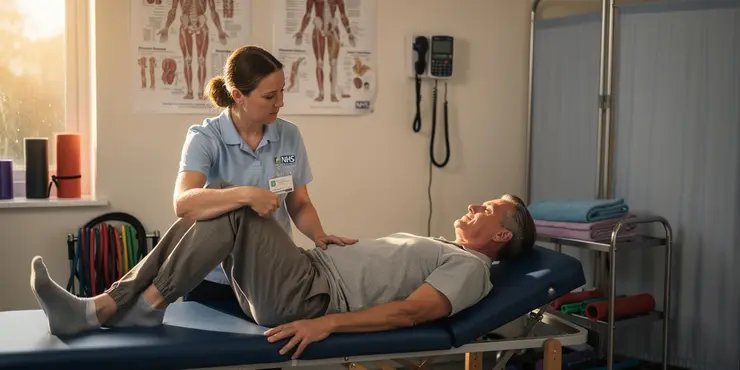
Exercises for sciatica: piriformis syndrome | NHS
Relevance: 21%
-

What is complex sleep apnea syndrome?
Relevance: 21%
-

What is complex sleep apnea syndrome?
Relevance: 21%
-

Turner syndrome: Beyond the classic XO phenotype
Relevance: 21%
-
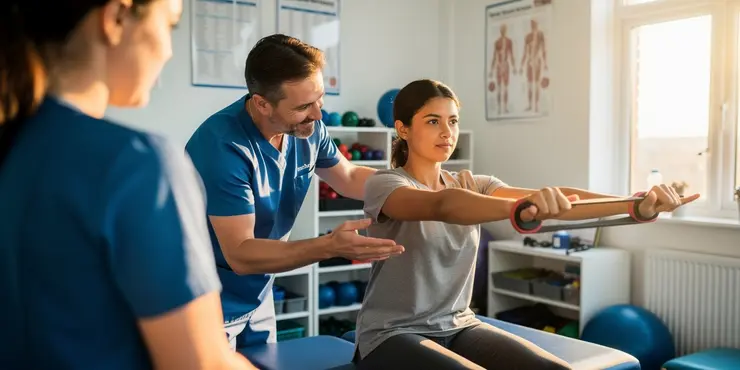
Greater trochanteric pain syndrome
Relevance: 21%
-

Having a child with Down's syndrome | NHS
Relevance: 21%
-

Staying Active: National Health Campaigns Promoting Physical Well-being
Relevance: 21%
Understanding Carpal Tunnel Syndrome
Carpal Tunnel Syndrome (CTS) is a common condition that affects the hand and wrist. It occurs when the median nerve, which runs from the forearm into the palm of the hand, becomes pressed or squeezed at the wrist. This can result in symptoms such as numbness, tingling, and weakness in the hand and arm. CTS is often caused by repetitive hand movements, wrist anatomy, or health conditions like diabetes and rheumatoid arthritis.
Impact on Work
For those in the UK workforce, Carpal Tunnel Syndrome can significantly affect daily activities, especially for jobs requiring repetitive hand movements or prolonged computer use. The ability to continue working will depend on the severity of the condition. Mild cases might allow individuals to maintain their work routine with some adjustments, such as ergonomic workplace arrangements, using wrist splints, or taking frequent breaks to rest the hands. It is crucial to consult with a healthcare professional to determine the best approach for managing symptoms while maintaining work commitments.
Employers in the UK have a duty of care to consider adjustments under the Health and Safety at Work Act 1974. If you have CTS, discussing options with your employer, such as modified duties or workplace assessments, could help in managing your condition while ensuring productivity.
Participating in Sports Activities
Engaging in sports can be challenging with Carpal Tunnel Syndrome, especially in activities that put strain on the wrist, such as weightlifting, tennis, or cycling. It is essential to listen to your body and avoid activities that exacerbate symptoms. For sports that are less demanding on the wrists, such as swimming or running, participation may still be possible if approved by a medical professional. Protective gear, such as wrist braces, can provide extra support and help in preventing further injury.
Consulting with a physiotherapist can be beneficial. They can provide exercises to strengthen the hand and wrist and offer guidance on which activities are safe to perform and how to modify them if necessary. A gradual return to sports, with proper warm-up exercises, can also help in reducing the risk of aggravating the condition.
Treatment and Management
Effectively managing Carpal Tunnel Syndrome involves a combination of rest, medical treatment, and lifestyle modifications. In some cases, non-surgical treatment options like wrist splinting, corticosteroid injections, or oral medications may alleviate symptoms. However, severe cases might require surgical intervention to relieve pressure on the median nerve. It is vital to seek a healthcare professional’s advice to tailor an effective treatment strategy that accommodates both work and sporting activities.
By understanding your limitations and seeking appropriate treatment, it is possible to continue with some level of work and sports activities even with Carpal Tunnel Syndrome, ensuring a balanced and healthy lifestyle.
Understanding Carpal Tunnel Syndrome
Carpal Tunnel Syndrome (CTS) is a condition that affects your hand and wrist. It happens when the median nerve, which goes from your forearm to your hand, is squeezed at the wrist. This can cause feelings of numbness, tingling, and weakness in your hand and arm. CTS can be caused by doing the same hand movements over and over, how your wrist is shaped, or health issues like diabetes and arthritis.
Impact on Work
If you have a job in the UK, Carpal Tunnel Syndrome can make it hard to do everyday tasks, especially if your job needs you to use your hands a lot or work on a computer for a long time. How much you can work depends on how bad it is. If it's not too bad, you might be able to keep working with some changes, like setting up your work area differently, using wrist supports, or taking regular breaks to rest your hands. It's important to talk to a doctor to find out the best way to manage your symptoms while working.
UK employers have to think about making changes for workers with CTS, because of the Health and Safety at Work Act 1974. If you have CTS, talk to your employer about things you can change at work, like doing different tasks or having a workplace check, to help manage your condition and keep working well.
Participating in Sports Activities
Playing sports can be hard with Carpal Tunnel Syndrome, especially sports that stress your wrist, like weightlifting, tennis, or cycling. It's important to pay attention to your body and avoid activities that make symptoms worse. Sports that don't stress the wrists as much, like swimming or running, might be okay if your doctor says so. Wearing wrist supports can give extra help and stop more injuries.
Seeing a physiotherapist can be helpful. They can give you exercises to make your hand and wrist stronger and show you which sports are safe and how to change them if needed. Going back to sports slowly, and doing warm-up exercises, can help avoid making CTS worse.
Treatment and Management
Managing Carpal Tunnel Syndrome well means resting, getting medical treatment, and changing how you live. Non-surgical options, such as using wrist supports, getting special injections, or taking medicine, can help some people feel better. But if it's really bad, surgery might be needed to take pressure off the nerve. It's important to talk to a doctor to find the best treatment plan that lets you keep working and playing sports.
By knowing what you can and cannot do and getting the right treatment, you can still do some work and sports activities with Carpal Tunnel Syndrome and live a balanced, healthy life.
Frequently Asked Questions
What is carpal tunnel syndrome?
Carpal tunnel syndrome is a condition caused by pressure on the median nerve in the wrist, leading to symptoms like pain, numbness, and tingling in the hand and arm.
Can I work with carpal tunnel syndrome?
It depends on the severity of your symptoms and the nature of your work. Some people can continue working with accommodations, while others may need to take a break.
Should I stop sports activities if I have carpal tunnel syndrome?
It depends on the sport and the severity of your symptoms. Consult with a healthcare professional to determine the best course of action.
What types of jobs are most affected by carpal tunnel syndrome?
Jobs that require repetitive hand and wrist movements, such as typing, assembly line work, or using vibrating tools, are more commonly affected.
Can I type with carpal tunnel syndrome?
You may be able to continue typing with ergonomic modifications and frequent breaks to reduce strain on your wrists.
What sports are safe to continue with carpal tunnel syndrome?
Low-impact sports that don't put extra pressure on the wrists, like swimming or yoga, might be safer. Consult a healthcare professional for personalized advice.
Should I wear a wrist brace at work for carpal tunnel syndrome?
Wearing a wrist brace can help stabilize your wrist and reduce symptoms, especially during activities that exacerbate your condition.
How can I modify my workspace to accommodate carpal tunnel syndrome?
Adjust your workstation for ergonomic efficiency: keep your wrists in a neutral position, use an ergonomic keyboard, and ensure your chair and desk height support proper posture.
Can physical therapy help with carpal tunnel syndrome while working?
Yes, physical therapy can strengthen your hands and wrists, and teach you exercises and stretches that may alleviate symptoms.
Is surgery the only option if I have severe carpal tunnel syndrome?
Surgery is one option, but there are also non-surgical treatments like splinting, corticosteroid injections, and physical therapy that may help.
How can I prevent carpal tunnel symptoms from worsening while working?
Take regular breaks, keep your wrists straight, use ergonomic tools, and perform stretches and exercises recommended by a healthcare professional.
Can playing musical instruments aggravate carpal tunnel syndrome?
Yes, if playing involves repetitive motions or prolonged hand positioning. Consider taking breaks and using ergonomic techniques.
Are there specific exercises I can do to help with carpal tunnel syndrome while at work?
Yes, wrist stretches, hand exercises, and strengthening routines can help reduce symptoms. Consult a physical therapist for a tailored plan.
Can massage therapy alleviate carpal tunnel syndrome symptoms?
Massage therapy may help reduce symptoms by relieving tension and improving circulation, but it's best used alongside other treatments.
How long should I rest from activities if diagnosed with carpal tunnel syndrome?
Rest duration depends on the severity. A healthcare provider can give personalized recommendations on rest and when to resume activities.
Are there alternative treatments for carpal tunnel syndrome?
Yes, treatments like acupuncture, yoga, and chiropractic care may offer relief, but always consult with a healthcare professional before trying new therapies.
Can weightlifting worsen carpal tunnel syndrome?
Heavy lifting can exacerbate symptoms, especially if done with improper form. Consider reducing weight or altering techniques.
Do cold compresses help with carpal tunnel syndrome symptoms at work?
Cold compresses can temporarily numb pain and reduce inflammation, providing short-term relief in the workplace.
Can I return to full sports participation after treatment for carpal tunnel syndrome?
With appropriate treatment and recovery, many can return to sports, but it varies per individual. A full recovery plan should be discussed with a healthcare provider.
Can ergonomic tools assist with managing carpal tunnel syndrome at work?
Yes, tools like an ergonomic keyboard and mouse can help reduce strain on your wrists, potentially alleviating symptoms.
What is carpal tunnel syndrome?
Carpal tunnel syndrome is a problem in your hand. It makes your hand hurt, tingle, or feel numb. This happens because a nerve in your wrist is squeezed.
Tips to help:
- Rest your hand often.
- Try to keep your wrist straight.
- Use a special wrist brace.
- Ask a doctor for help if it hurts a lot.
Carpal tunnel syndrome happens when there's pressure on a nerve in your wrist called the median nerve. This can make your hand and arm hurt, feel numb, or tingle.
Can I work if I have carpal tunnel syndrome?
It depends on how bad your symptoms are and what kind of job you have. Some people can keep working if they get help, but others might need to take a break.
Should I stop sports if I have carpal tunnel syndrome?
If you have carpal tunnel syndrome (pain in your wrist), you might wonder if you should stop playing sports.
Here are some tips:
- Talk to your doctor. They can tell you what is best for you.
- Listen to your body. If something hurts, stop doing it.
- Try gentle stretching exercises for your wrist.
- Use special wrist supports if needed.
- Ask a coach or therapist for advice.
Always be careful and take breaks if you need to.
It depends on what sport you want to play and how bad you feel. Talk to a doctor to find out what you should do next.
What jobs are most affected by carpal tunnel syndrome?
Some jobs can make your hands and wrists hurt.
This is called carpal tunnel syndrome.
Here are some jobs where people might get it:
- Jobs where you type a lot on a computer.
- Jobs where you use tools that shake, like a drill.
- Jobs where you use your hands the same way again and again, like sewing.
- Jobs that need you to work with small things, like assembly line work.
If you have these jobs, it's good to take breaks often.
Stretch your hands and wrists to feel better.
Some jobs make your hands and wrists move the same way over and over. These jobs can make your hands hurt. Jobs like typing on a computer, working on an assembly line, or using tools that shake can cause these problems.
Can I type if my hands hurt?
Do your hands or wrists hurt when you type? This can be called carpal tunnel syndrome.
You can still type, but here are some ways to make it easier:
- Take short breaks often.
- Use a soft cushion to rest your wrists.
- Keep your hands and wrists straight.
- Try voice typing tools to speak instead of typing.
If it keeps hurting, talk to a doctor or a health person who helps hands.
You can keep typing if you make some changes and take lots of breaks. This helps your wrists feel better.
Which sports can I play if I have carpal tunnel syndrome?
If you have carpal tunnel syndrome, it's important to choose sports that are safe for your hands. Here are some sports you can try:
- Walking - It's gentle on your hands.
- Swimming - It can help your hands feel better.
- Cycling - Use a bike with comfortable handles.
Remember to talk to a doctor or therapist. They can give you advice and special exercises to help your hands.
Some sports are gentle and don't hurt your wrists. Swimming and yoga are good choices. It's smart to talk to a doctor or healthcare expert to get advice just for you.
Should I wear a wrist brace at work for carpal tunnel syndrome?
Carpal tunnel syndrome can make your wrist hurt. A wrist brace can help support your wrist and make it feel better.
Here is what you can do:
- Wear a wrist brace to support your wrist.
- Take breaks to rest your hand and wrist.
- Ask a doctor or therapist for advice.
- Use a keyboard and mouse that are comfortable.
Wear the wrist brace if it helps your wrist feel better. Always talk to a doctor for the best advice.
Wearing a wrist brace can help keep your wrist steady. It can also help you feel better, especially when you do things that make your wrist hurt more.
How can I change my workspace to help with carpal tunnel syndrome?
If your wrist hurts because of carpal tunnel, you can change your workspace to feel better.
Here are some easy ideas:
- Desk and Chair: Adjust your chair so your feet are flat on the floor.
- Keyboard: Keep your keyboard at the same height as your elbows. This helps your wrists stay straight.
- Mouse: Use a comfy mouse, close to your keyboard.
- Wrist Rest: Use a soft pad under your wrists when you type.
- Breaks: Take short breaks to rest your hands every hour.
Ask an adult for help if you need to adjust your workspace or find special tools.
Set up your work area so it is comfy for your body. Keep your wrists straight, use a special keyboard that's good for your hands, and make sure your chair and desk are at the right height for sitting up straight.
Can exercises help with hand pain while working?
Do hand exercises make your hand feel better at work?
Yes, exercises can help your hand feel better if it hurts from work. Here are some tips:
- Take breaks to rest your hands.
- Do gentle hand stretches.
- Use a soft pad for your wrists when typing.
- Ask a doctor or therapist for more ideas.
Yes, physical therapy can make your hands and wrists stronger. It can also show you exercises and stretches to help you feel better.
If you need extra help, you can:
- Use big pictures or drawings to see how to do the exercises.
- Work with a helper or therapist to show you.
Is surgery the only way to fix bad carpal tunnel syndrome?
If you have carpal tunnel syndrome, it means your hand might hurt or feel numb. There are different ways to help make it better.
Here are some things you can try:
- Wrist splint: Wearing a special brace can help hold your wrist still. This can make it feel better.
- Medicines: Some pills can help with pain and swelling.
- Hand exercises: Moving your hands in special ways can make them stronger and feel better.
- Changing activities: Doing things in a different way can help your wrist feel good.
Sometimes, surgery is needed. A doctor can help you decide what's best.
You can have surgery, but there are other ways to help too. These ways do not need surgery. You can use a splint, get injections called corticosteroids, or do special exercises called physical therapy. These might help you feel better.
How can I stop my wrist pain from getting worse when I work?
Here are some simple tips to help you:
- Take breaks: Stop and rest your hands every hour. Shake them out gently.
- Check your posture: Sit up straight. Keep your wrists straight, not bent.
- Stretch often: Stretch your fingers, hands, and wrists. Do this a few times a day.
- Use soft padding: Use a soft pad under your wrists when you use the computer.
- Try special tools: Use a keyboard and mouse made to be gentle on your wrists.
- Ask for help: If you are in pain, tell a doctor.
These tips can help you work comfortably and protect your wrists.
Take breaks often. Keep your wrists straight. Use tools that feel good and help your body. Do stretches and exercises a doctor or therapist suggests.
Can playing musical instruments make carpal tunnel syndrome worse?
Carpal tunnel syndrome is when your hand and fingers hurt or feel numb. Playing instruments like guitar or piano might cause this pain to get worse. You should pay attention to any pain or weird feelings.
Here are some tips to help:
- Take breaks when playing.
- Do hand and wrist exercises.
- Ask a doctor or an adult for advice.
- Use tools like wrist supports to help.
Yes, if you do the same hand moves a lot or hold your hands in one position for a long time. Try to take breaks and use good hand positions.
What exercises can I do at work to help with carpal tunnel syndrome?
Here are some exercises you can try:
- Wrist Stretch: Hold your hand out with your palm facing up. Use your other hand to gently bend your hand back. Hold for 5 seconds. Do this 5 times.
- Finger Bends: Make a fist with your hand. Open your hand and stretch your fingers out wide. Do this 10 times.
- Thumb Stretch: Hold your palm up. Gently pull your thumb away from your hand. Hold for 5 seconds. Do this 5 times.
Remember, if these exercises hurt, you should stop.
Here are some tips to help:
- Take short breaks and relax your hands.
- Try to keep your wrists straight when typing.
- Use a soft pad to rest your wrists while typing.
Yes, doing stretches for your wrist and exercises for your hand can help you feel better. Getting stronger is good too. A physical therapist can make a special plan just for you.
Here are some tips to help you:
- Try to move your hands and wrists gently every day.
- Take breaks if you are using your hands a lot, like when typing.
- Use things like stress balls to make your hands stronger.
- Ask an adult for help if you need it.
Can massage help with carpal tunnel symptoms?
Carpal tunnel syndrome can make your hands hurt or feel tingly. Massage might help you feel better. If you think massage could help you, ask an adult you trust or a healthcare professional. You can also watch simple videos or use picture guides to see how it is done.
Massage can help you feel better by making your muscles relax and helping your blood move around your body. But, you should use massage with other treatments for the best results.
How long should I rest if I have carpal tunnel syndrome?
If your doctor says you have carpal tunnel syndrome, you need to rest your hand and wrist.
Here is what you can do:
- Take breaks: Stop using your hand and wrist often.
- Listen to your doctor: Follow their advice on rest time.
- Use tools: Try using wrist braces to keep your wrist straight.
- Do gentle exercises: Sometimes moving your hands gently can help.
Ask someone to help you understand if you need it.
How long you need to rest depends on how bad you feel. A doctor or nurse can tell you how long to rest and when you can start doing things again.
Can you treat carpal tunnel syndrome in other ways?
Carpal tunnel syndrome can make your hand hurt or feel tingly. You might want to try other ways to make it better. Here are some ideas:
- Wrist Splint: Wear a special wrist band at night to keep your wrist straight.
- Exercises: Do simple hand exercises to help your wrist feel better.
- Take Breaks: Rest your hands often if you do a lot of typing or writing.
- Ice Pack: Put a cold pack on your wrist to reduce swelling.
- See a Therapist: A therapist can show you ways to help your wrist.
These ideas might help. You can ask your doctor for more advice.
Yes, things like acupuncture, yoga, and chiropractic care can help you feel better. But, you should always talk to a doctor or nurse before trying any new treatments.
Can weightlifting make carpal tunnel syndrome worse?
Carpal tunnel syndrome is when your wrist hurts or feels tingly. Weightlifting could make it worse because it puts pressure on your wrist. Be careful when lifting weights.
Here are some tips to help:
- Use wrist supports to protect your wrists.
- Don't lift weights that are too heavy for you.
- Take breaks to rest your hands and wrists.
- Stretch your wrists before and after lifting.
Lifting heavy things can make symptoms worse, especially if you do it the wrong way. Try lifting lighter things or changing how you lift.
Can cold packs help with carpal tunnel pain at work?
Do your hands hurt or feel tingly at work?
Cold packs might help!
Put a cool pack on your wrist.
This can make it feel better.
Ask an adult for help if needed.
Using something cold can help make pain feel better for a little while. It can also help with swelling. This is good when you need quick relief at work.
Can I play sports again after carpal tunnel treatment?
If you had treatment for carpal tunnel, you might wonder if you can play sports like before. You might be able to return to sports, but talk to your doctor first.
Here’s what can help you:
- Ask the Doctor: Ask your doctor when it is safe to start playing sports again.
- Take it Slow: Start with easy exercises. Slowly do more as you feel better.
- Use Special Tools: Use wrist supports or bands if needed. These can help your wrist feel better.
- Listen to Your Body: If something hurts, stop and rest. Your body needs time to heal.
With the right help, many people can play sports again. But it is different for everyone. It is important to talk to a doctor about getting better.
Can special tools help with wrist pain at work?
Yes, using special tools like a comfy keyboard and mouse can help make your wrists feel better. These tools can stop your wrists from hurting.
Useful Links
This website offers general information and is not a substitute for professional advice.
Always seek guidance from qualified professionals.
If you have any medical concerns or need urgent help, contact a healthcare professional or emergency services immediately.
Some of this content was generated with AI assistance. We’ve done our best to keep it accurate, helpful, and human-friendly.
- Ergsy carfully checks the information in the videos we provide here.
- Videos shown by Youtube after a video has completed, have NOT been reviewed by ERGSY.
- To view, click the arrow in centre of video.
- Most of the videos you find here will have subtitles and/or closed captions available.
- You may need to turn these on, and choose your preferred language.
- Go to the video you'd like to watch.
- If closed captions (CC) are available, settings will be visible on the bottom right of the video player.
- To turn on Captions, click settings .
- To turn off Captions, click settings again.
More Items From Ergsy search
-

Can I work or continue sports activities if I have Carpal Tunnel Syndrome?
Relevance: 100%
-

Carpal Tunnel Syndrome
Relevance: 92%
-

What causes Carpal Tunnel Syndrome?
Relevance: 84%
-

How is Carpal Tunnel Syndrome diagnosed?
Relevance: 82%
-

What is Carpal Tunnel Syndrome (CTS)?
Relevance: 82%
-

Is Carpal Tunnel Syndrome covered by the NHS?
Relevance: 82%
-
How can I prevent Carpal Tunnel Syndrome?
Relevance: 80%
-

When should I consider surgery for Carpal Tunnel Syndrome?
Relevance: 77%
-

Can Carpal Tunnel Syndrome recur after treatment?
Relevance: 77%
-

What non-surgical treatments are available for Carpal Tunnel Syndrome?
Relevance: 75%
-

Are there any alternative treatments for Carpal Tunnel Syndrome?
Relevance: 75%
-

What does Carpal Tunnel Syndrome surgery involve?
Relevance: 75%
-

Are there specific exercises that can help with Carpal Tunnel Syndrome?
Relevance: 74%
-

What are the common symptoms of Carpal Tunnel Syndrome?
Relevance: 71%
-

Can lifestyle changes help manage Carpal Tunnel Syndrome?
Relevance: 70%
-

What is the recovery time after Carpal Tunnel Surgery?
Relevance: 57%
-

Do I need additional cover for adventure sports or activities?
Relevance: 40%
-

Is it safe to participate in group sports while pregnant?
Relevance: 29%
-

Can playing sports increase the risk of a concussion?
Relevance: 29%
-

Advice on sports injuries
Relevance: 29%
-

Can you participate in sports or physical activities with a stoma bag?
Relevance: 29%
-

Can chiropractors help with sports injuries?
Relevance: 25%
-

When is it safe to return to normal activities after a concussion?
Relevance: 25%
-

Ask a physio: 3 common sports injuries and what happens next
Relevance: 23%
-

What is Cushing's syndrome?
Relevance: 23%
-

Is chronic fatigue syndrome contagious?
Relevance: 23%
-

Munchausen's syndrome | NHS
Relevance: 23%
-

Down's syndrome: Emily's story | NHS
Relevance: 22%
-

Prader-Willi Syndrome | NHS
Relevance: 22%
-

What causes chronic fatigue syndrome?
Relevance: 22%
-

The Benefits of Family Activities
Relevance: 22%
-
What is chronic fatigue syndrome?
Relevance: 21%
-

Charles Bonnet Syndrome
Relevance: 21%
-

Exercises for sciatica: piriformis syndrome | NHS
Relevance: 21%
-

What is complex sleep apnea syndrome?
Relevance: 21%
-

What is complex sleep apnea syndrome?
Relevance: 21%
-

Turner syndrome: Beyond the classic XO phenotype
Relevance: 21%
-

Greater trochanteric pain syndrome
Relevance: 21%
-

Having a child with Down's syndrome | NHS
Relevance: 21%
-

Staying Active: National Health Campaigns Promoting Physical Well-being
Relevance: 21%


